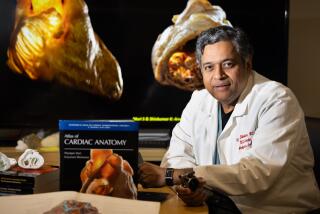Jeff Getty, 49; 1st Person to Receive Transplant of Marrow From Baboon
- Share via
Jeff Getty, an AIDS patient and activist who in 1995 received the first baboon-to-human bone marrow transplant in an effort to prolong his life, died Oct. 9. He was 49.
Getty died of cardiac arrest at HiDesert Medical Center in Joshua Tree, Calif., his longtime partner Kenneth Klueh said Monday. He had been a resident of Joshua Tree for the last four years.
Getty was 38 when he elected to have the bone marrow of a baboon infused into his body. Surgery was performed Dec. 14, 1995, at San Francisco General Hospital. At the time he had been infected with HIV for 14 years and was told by doctors that he had less than one year to live.
Critics in the medical research community warned that the transplant could hasten Getty’s death, in part because he could have animal viruses transmitted to him as a result of the procedure. Animal rights activists were opposed because the transplant required killing the baboon donor.
The highly experimental operation required the permission of the Food and Drug Administration, which Getty fought for two years to obtain.
“I’m going to die anyway,” he told The Times in July 1995, once he had the FDA’s approval. “Let’s get on with finding some answers about the disease. If this saves me, then I got lucky.”
Unlike humans, most primates are resistant to the HIV virus, Getty’s doctors said before the surgery. The hope was that the baboon cells would take root in Getty’s bones and fight off AIDS in his body.
Getty’s body rejected the baboon cells. A number of scientists continued to follow his progress, concerned about the risk of new viruses from the baboon. Four years after the surgery, the FDA banned further such transplants.
During the first year after the procedure, Getty’s health improved considerably. The reasons remained unclear. His doctors theorized that it could have been due, in part, to other treatments that he received in conjunction with the surgery, including radiation and chemotherapy.
“I have definitely bought some time,” Getty told the New York Times in 1996.
He wanted to see transplant surgeries like his continue to be performed, with close monitoring.
“There’s validity to being concerned about cross-species disease, but it shouldn’t stop the research,” he told the New York Times in 1998.
By the time of his controversial surgery, Getty was a well-known AIDS activist.
“Jeff was the consummate patient advocate,” said Jeff Sheehy, a member of the governing board of the California Institute for Regenerative Medicine, an independent state agency.
Getty was a leader in the push to allow organ transplants for AIDS patients. In many cases, strong drug treatments damaged their livers or kidneys.
“The thinking was, ‘Don’t waste the healthy organ on someone whose prognosis is bleak,’ ” Sheehy told The Times on Monday.
Frustrated by that thinking, Getty threw a coffin on the lawn of a San Francisco hospital during a demonstration in 1999.
Now more surgeons are willing to perform organ transplants on HIV-positive patients.
As an activist, Getty also fought for “compassionate access” to AIDS drugs before they were approved by the FDA.
“Jeff argued with drug companies that people in desperate straits would survive longer if they could get access,” Sheehy said
It is now common for experimental drugs to be made available to HIV patients, Sheehy said.
Born on July 14, 1957, in Connecticut, Getty moved to San Francisco in the 1970s, said Klueh, his partner of 26 years. They lived in Oakland through the 1990s before relocating to Joshua Tree.
Getty graduated from the New College of California in San Francisco, Klueh said. He was a journalism major.
He worked as an administrative analyst at UC Berkeley from 1980 until 1988.
Through the 1990s, he was increasingly visible as a leader of the advocacy group ACT UP Golden Gate.
In addition to Klueh, Getty is survived by his father, Edward; and three sisters. A memorial service is pending.
Contributions in his name can be made to Maitri Compassionate Care, 401 Duboce Ave., San Francisco, CA 94117, or on the website www.maitrisf.org.
*
More to Read
Sign up for Essential California
The most important California stories and recommendations in your inbox every morning.
You may occasionally receive promotional content from the Los Angeles Times.













